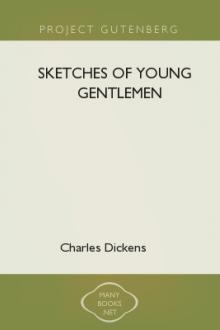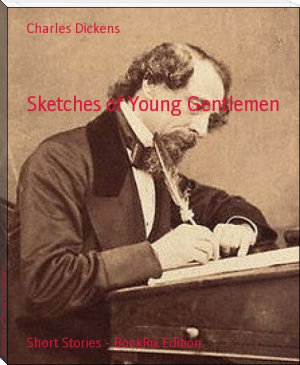Sketches of Young Gentlemen by Charles Dickens (little bear else holmelund minarik .txt) 📕

- Author: Charles Dickens
- Performer: -
Book online «Sketches of Young Gentlemen by Charles Dickens (little bear else holmelund minarik .txt) 📕». Author Charles Dickens
We have made it a practice since, to take the Horse Guards in our daily walk, and we find it is the custom of military young gentlemen to plant themselves opposite the sentries, and contemplate them at leisure, in periods varying from fifteen minutes to fifty, and averaging twenty-five. We were much struck a day or two since, by the behaviour of a very promising young butcher who (evincing an interest in the service, which cannot be too strongly commanded or encouraged), after a prolonged inspection of the sentry, proceeded to handle his boots with great curiosity, and as much composure and indifference as if the man were wax-work.
But the really military young gentleman is waiting all this time, and at the very moment that an apology rises to our lips, he emerges from the barrack gate (he is quartered in a garrison town), and takes the way towards the high street. He wears his undress uniform, which somewhat mars the glory of his outward man; but still how great, how grand, he is! What a happy mixture of ease and ferocity in his gait and carriage, and how lightly he carries that dreadful sword under his arm, making no more ado about it than if it were a silk umbrella! The lion is sleeping: only think if an enemy were in sight, how soon he’d whip it out of the scabbard, and what a terrible fellow he would be!
But he walks on, thinking of nothing less than blood and slaughter; and now he comes in sight of three other military young gentlemen, arm-in-arm, who are bearing down towards him, clanking their iron heels on the pavement, and clashing their swords with a noise, which should cause all peaceful men to quail at heart. They stop to talk. See how the flaxen-haired young gentleman with the weak legs-he who has his pocket-handkerchief thrust into the breast of his coat-glares upon the fainthearted civilians who linger to look upon his glory; how the next young gentleman elevates his head in the air, and majestically places his arms a-kimbo, while the third stands with his legs very wide apart, and clasps his hands behind him. Well may we inquire-not in familiar jest, but in respectful earnest-if you call that nothing. Oh! if some encroaching foreign power-the Emperor of Russia, for instance, or any of those deep fellows, could only see those military young gentlemen as they move on together towards the billiard-room over the way, wouldn’t he tremble a little!
And then, at the Theatre at night, when the performances are by command of Colonel Fitz-Sordust and the officers of the garrison-what a splendid sight it is! How sternly the defenders of their country look round the house as if in mute assurance to the audience, that they may make themselves comfortable regarding any foreign invasion, for they (the military young gentlemen) are keeping a sharp look-out, and are ready for anything. And what a contrast between them, and that stage-box full of grey-headed officers with tokens of many battles about them, who have nothing at all in common with the military young gentlemen, and who-but for an old-fashioned kind of manly dignity in their looks and bearing-might be common hard-working soldiers for anything they take the pains to announce to the contrary!
Ah! here is a family just come in who recognise the flaxen-headed young gentleman; and the flaxen-headed young gentleman recognises them too, only he doesn’t care to show it just now. Very well done indeed! He talks louder to the little group of military young gentlemen who are standing by him, and coughs to induce some ladies in the next box but one to look round, in order that their faces may undergo the same ordeal of criticism to which they have subjected, in not a wholly inaudible tone, the majority of the female portion of the audience. Oh! a gentleman in the same box looks round as if he were disposed to resent this as an impertinence; and the flaxen-headed young gentleman sees his friends at once, and hurries away to them with the most charming cordiality.
Three young ladies, one young man, and the mamma of the party, receive the military young gentleman with great warmth and politeness, and in five minutes afterwards the military young gentleman, stimulated by the mamma, introduces the two other military young gentlemen with whom he was walking in the morning, who take their seats behind the young ladies and commence conversation; whereat the mamma bestows a triumphant bow upon a rival mamma, who has not succeeded in decoying any military young gentlemen, and prepares to consider her visitors from that moment three of the most elegant and superior young gentlemen in the whole world.
THE POLITICAL YOUNG GENTLEMANOnce upon a time-NOT in the days when pigs drank wine, but in a more recent period of our history-it was customary to banish politics when ladies were present. If this usage still prevailed, we should have had no chapter for political young gentlemen, for ladies would have neither known nor cared what kind of monster a political young gentleman was. But as this good custom in common with many others has ‘gone out,’ and left no word when it is likely to be home again; as political young ladies are by no means rare, and political young gentlemen the very reverse of scarce, we are bound in the strict discharge of our most responsible duty not to neglect this natural division of our subject.
If the political young gentleman be resident in a country town (and there ARE political young gentlemen in country towns sometimes), he is wholly absorbed in his politics; as a pair of purple spectacles communicate the same uniform tint to all objects near and remote, so the political glasses, with which the young gentleman assists his mental vision, give to everything the hue and tinge of party feeling. The political young gentleman would as soon think of being struck with the beauty of a young lady in the opposite interest, as he would dream of marrying his sister to the opposite member.
If the political young gentleman be a Conservative, he has usually some vague ideas about Ireland and the Pope which he cannot very clearly explain, but which he knows are the right sort of thing, and not to be very easily got over by the other side. He has also some choice sentences regarding church and state, culled from the banners in use at the last election, with which he intersperses his conversation at intervals with surprising effect. But his great topic is the constitution, upon which he will declaim, by the hour together, with much heat and fury; not that he has any particular information on the subject, but because he knows that the constitution is somehow church and state, and church and state somehow the constitution, and that the fellows on the other side say it isn’t, which is quite a sufficient reason for him to say it is, and to stick to it.
Perhaps his greatest topic of all, though, is the people. If a fight takes place in a populous town, in which many noses are broken, and a few windows, the young gentleman throws down the newspaper with a triumphant air, and exclaims, ‘Here’s your precious people!’ If half-a-dozen boys run across the course at race time, when it ought to be kept clear, the young gentleman looks indignantly round, and begs you to observe the conduct of the people; if the gallery demand a hornpipe between the play and the afterpiece, the same young gentleman cries ‘No’ and ‘Shame’ till he is hoarse, and then inquires with a sneer what you think of popular moderation NOW; in short, the people form a never-failing theme for him; and when the attorney, on the side of his candidate, dwells upon it with great power of eloquence at election time, as he never fails to do, the young gentleman and his friends, and the body they head, cheer with great violence against THE OTHER PEOPLE, with whom, of course, they have no possible connexion. In much the same manner the audience at a theatre never fail to be highly amused with any jokes at the expense of the public-always laughing heartily at some other public, and never at themselves.
If the political young gentleman be a Radical, he is usually a very profound person indeed, having great store of theoretical questions to put to you, with an infinite variety of possible cases and logical deductions therefrom. If he be of the utilitarian school, too, which is more than probable, he is particularly pleasant company, having many ingenious remarks to offer upon the voluntary principle and various cheerful disquisitions connected with the population of the country, the position of Great Britain in the scale of nations, and the balance of power. Then he is exceedingly well versed in all doctrines of political economy as laid down in the newspapers, and knows a great many parliamentary speeches by heart; nay, he has a small stock of aphorisms, none of them exceeding a couple of lines in length, which will settle the toughest question and leave you nothing to say. He gives all the young ladies to understand, that Miss Martineau is the greatest woman that ever lived; and when they praise the good looks of Mr.
Hawkins the new member, says he’s very well for a representative, all things considered, but he wants a little calling to account, and he is more than half afraid it will be necessary to bring him down on his knees for that vote on the miscellaneous estimates. At this, the young ladies express much wonderment, and say surely a Member of Parliament is not to be brought upon his knees so easily; in reply to which the political young gentleman smiles sternly, and throws out dark hints regarding the speedy arrival of that day, when Members of Parliament will be paid salaries, and required to render weekly accounts of their proceedings, at which the young ladies utter many expressions of astonishment and incredulity, while their lady-mothers regard the prophecy as little else than blasphemous.
It is extremely improving and interesting to hear two political young gentlemen, of diverse opinions, discuss some great question across a dinner-table; such as, whether, if the public were admitted to Westminster Abbey for nothing, they would or would not convey small chisels and hammers in their pockets, and immediately set about chipping all the noses off the statues; or whether, if they once got into the Tower for a shilling, they would not insist upon trying the crown on their own heads, and loading and firing off all the small arms in the armoury, to the great discomposure of Whitechapel and the Minories. Upon these, and many other momentous questions which agitate the public mind in these desperate days, they will discourse with great vehemence and irritation for a considerable time together, both leaving off precisely where they began, and each thoroughly persuaded that he has got the better of the other.
In society, at assemblies, balls, and playhouses, these political young gentlemen are perpetually on the watch for a political allusion, or anything which can be tortured or construed into being one; when, thrusting themselves into the very smallest openings for their favourite discourse, they fall upon the unhappy company tooth and nail. They have recently had many favourable opportunities of opening in churches, but as there the clergyman has it all his own





Comments (0)